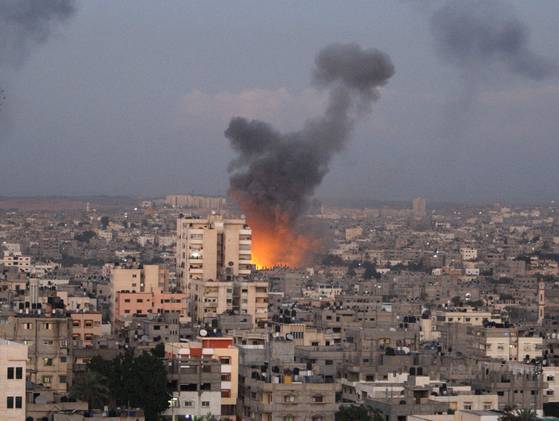The joint IDF-Shin Bet air strike that killed Ahmed Jabari, Hamas's senior military commander in Gaza, appears to present one of two scenarios: the decapitation strike heralds a finale to Israeli Prime Minister Benjamin Netanyahu's campaign against Gaza's elusive rocket-launchers, or the beginning of a new war that could exceed the last.
Current developments suggest that the first option remains an outside possibility. Having bagged a trophy for his voting public, Netanyahu may attempt to stay out of a longer, more costly intervention of the Gaza Strip and protect the gains he has secured. Or someone could manage to talk some sense into him, and convince him that a large-scale operation in or above Gaza is not the means to win votes in the UN General Assembly.
However Hamas and Gaza's militant offshoots have no choice except to deliver on their promised retaliation, a cycle that Israel is equally willing to perpetuate. Multiple "truces" have immediately broken down and both sides attribute responsibility to the other. This fire is likely to heat up before cooling down. On Monday the Islamic Jihad's Khaled al-Batsh explained his group's status: "The ball is in Israel's court. The resistance factions will observe Israel's behavior on the ground and will act accordingly."
Israeli Home Defense Minister Avi Dichter announced on Tuesday, "There is no precedent in history of destroying terror by air power alone. It hasn't happened and it won't happen. Thus it is necessary to reformat Gaza altogether."
The air strike on Jabari soon followed.
In the event of a large-scale conflict in Gaza, its fourth-generation waves will reach across oceans and could seriously threaten the region's stability. More political theater than war at this point, Netanyahu is visibly positioning his right-wing coalition with Foreign Minister Avigdor Lieberman for January 22d's election. He's also sending a twisted message to the UN General Assembly, as if to prove that Israel will do whatever it wants if it feels threatened. This message has been repeatedly delivered to and discarded by a sizable portion of the international community, which views Israel's disproportionate response as counterproductive to solving Gaza's dilemma. Its latest air strikes are on their way to killing more civilians than Palestinian rockets killed in the last 3 years.
The Israeli government is already floating the idea of withdrawing completely from the Oslo Accords if Mahmoud Abbas plays his hand for "advanced status" on November 29th.
And is there any coincidence to the fact that Ahmed Jabari was assassinated on the same day that President Barack Obama issued his first post-election address, remarks that focused on diplomacy with Iran? The attack on Gaza appears to be aimed equally at Hamas, Iran and Obama, who allowed 2008's invasion to pass in silence and appears unable to stop another. Obama could opt split the difference by opposing war in Gaza and the Palestinians's UN bid; Tehran, Damascus and Cairo's responses are less predictable. None of these options promise much for the people on the ground.
Many combustible factors are reacting to each other in the region, turning Gaza into a microcosm of its surroundings. Information and disinformation has spiked, and further advances in social media will infect the conflict. Only time will shakedown the possibilities into reality.
[Update - The U.S. State Department has just released the following statement voicing unequivocal support for Israel's actions:
STATEMENT BY MARK TONER, DEPUTY SPOKESPERSON
U.S. STATE DEPARTMENT
Gaza Rocket Attacks
We strongly condemn the barrage of rocket fire from Gaza into southern Israel, and we regret the death and injury of innocent Israeli and Palestinian civilians caused by the ensuing violence. There is no justification for the violence that Hamas and other terrorist organizations are employing against the people of Israel. We call on those responsible to stop these cowardly acts immediately. We support Israel’s right to defend itself, and we encourage Israel to continue to take every effort to avoid civilian casualties.
Hamas claims to have the best interests of the Palestinian people at heart, yet it continues to engage in violence that is counterproductive to the Palestinian cause. Attacking Israel on a near daily basis does nothing to help Palestinians in Gaza or to move the Palestinian people any closer to achieving self determination.
[Update - The U.S. State Department has just released the following statement voicing unequivocal support for Israel's actions:
STATEMENT BY MARK TONER, DEPUTY SPOKESPERSON
U.S. STATE DEPARTMENT
Gaza Rocket Attacks
We strongly condemn the barrage of rocket fire from Gaza into southern Israel, and we regret the death and injury of innocent Israeli and Palestinian civilians caused by the ensuing violence. There is no justification for the violence that Hamas and other terrorist organizations are employing against the people of Israel. We call on those responsible to stop these cowardly acts immediately. We support Israel’s right to defend itself, and we encourage Israel to continue to take every effort to avoid civilian casualties.
Hamas claims to have the best interests of the Palestinian people at heart, yet it continues to engage in violence that is counterproductive to the Palestinian cause. Attacking Israel on a near daily basis does nothing to help Palestinians in Gaza or to move the Palestinian people any closer to achieving self determination.


No comments:
Post a Comment